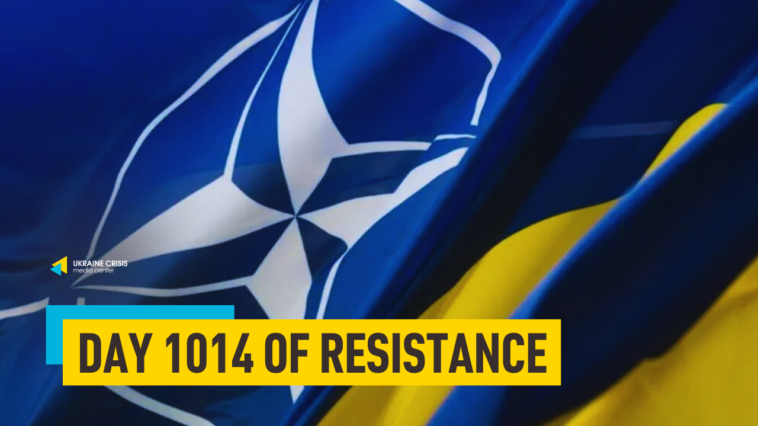Ukraine says it will not settle for any security guarantees other than full NATO membership. Zelenskyi names the most difficult areas on the front lines.
Ukraine says it will not settle for any security guarantees other than full NATO membership
Ukraine will not accept any security guarantees other than full NATO membership, the Ukrainian Foreign Ministry said in a statement on Tuesday. The day marks 30 years since the Budapest Memorandum was signed. The message was issued ahead of a meeting of the NATO-Ukraine Council in Brussels on the same day and the NATO Foreign Ministerial on Tuesday and Wednesday.
“This week, 5 December 2024, marks the 30th anniversary of the signing of the Memorandum on Security Assurances in connection with Ukraine’s accession to the Treaty on the Non-Proliferation of Nuclear Weapons, also known as the Budapest Memorandum. This document was supposed to provide Ukraine with guarantees of security, sovereignty and territorial integrity in exchange for giving up the world’s third largest nuclear arsenal,” the ministry said in a statement.
“However, in 2014, the Russian Federation, which was one of the guarantors of Ukraine’s security under the Budapest Memorandum, blatantly disregarded this document and international law in general and launched its aggression against Ukraine, which escalated into a full-scale invasion in 2022,” it continued.
which was supposed to protect Ukraine after it gave up its nuclear weapons, turned out to be meaningless.
Failure of the Budapest Memorandum to protect Ukraine led to a situation where security threats mounted not just for the country, but globally.
“Not providing Ukraine with real, effective security guarantees in the 1990s was a strategic mistake that Moscow exploited. This mistake must be corrected. Ukraine must be provided with clear, legally binding security guarantees that align with its significant contribution to global nuclear disarmament and the maintenance of international peace and security,” the ministry said.
Ukraine’s Foreign Ministry called on all countries party to the Treaty on the Non-Proliferation of Nuclear Weapons to support the provision of security guarantees to Ukraine.
“We are convinced that the only real guarantee of security for Ukraine, as well as a deterrent to further Russian aggression against Ukraine and other states, is Ukraine’s full membership in NATO. With the bitter experience of the Budapest Memorandum behind us, we will not accept any alternatives, surrogates or substitutes for Ukraine’s full membership in NATO,” the message reads.
“Inviting Ukraine to join NATO now will become an effective counter to Russian blackmail and will deprive the Kremlin of its illusions about the possibility of hindering Ukraine’s Euro-Atlantic integration. It is also the only chance to stop the erosion of key principles of nuclear non-proliferation and restore confidence in nuclear disarmament,” it continues.
The 30th anniversary of the signing of the Budapest Memorandum is a convenient opportunity to take an effective step towards Ukraine’s accession to the Washington Treaty, the ministry added.
Zelenskyi names most difficult areas on front lines
Ukrainian President Volodymyr Zelenskyi said in a message on Telegram Tuesday that he had heard a report from Commander-in-Chief of the Armed Forces of Ukraine, Colonel General Oleksandr Syrskyi.
The directions of Kurakhove and Pokrovsk remain the most difficult ones across the front lines, he said. “I am grateful to every unit that destroys the occupying force and holds back Russia’s advance,” he added.
Zelenskyi also said the results of a defensive effort in the Zaporizhzhia direction were “not bad”. The discussion between the President and the army chief was also about the Ukrainian operation in the Kursk region. “We continue to inflict heavy losses on Russia on its territory,” Zelenskyi said.
The most difficult situation along the frontlines is in the Kurakhove direction, Ukrainian OSINT project DeepState said on November 15. It accounts for 690 combat engagements in the past two weeks. In a report on November 27, the Institute for the Study of War (ISW) said it observed geolocated evidence to assess that Russian forces had seized 43 per cent of Kurakhove.
As of November 27, 625 residents remained in Kurakhove, according to the Khortytsia operational-strategic group of forces. An ISW report of November 25 said Russian forces were trying to envelop Ukrainian troops east of the O0510 Kurakhove – Velyka Novosilka highway and were aiming to encircle Velyka Novosilka.
DeepState said on November 30 that the situation in and around Kurakhove continued to deteriorate.




